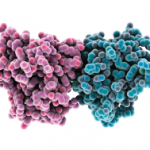The mice also showed an increase in the factor SOCS-3 which regulates immune responses. One possible explanation for this finding might relate to the link between blocking SphK1 and a resulting increase in ceramide, which may in turn stimulate SOCS-3 production, Dr. Gilkeson said. “We postulate, but we haven’t proven it, that the higher levels of ceramide that are present in the knockout mice are increasing the SOCS-3,” he said.
At this point, there have been no significant side effects identified in the knockout mice, Dr. Gilkeson told meeting attendees. “There have not been any toxicities—the mice themselves look fine,” he said.
Pharmaceutical companies are already pursuing treatments that can inhibit sphingosine kinase in other diseases, including cancer, he said. “I think we will soon have a plethora of agents that can address this pathway.” Dr. Gilkeson also noted that it remains to be seen whether a drug that blocks a particular enzyme works better or worse than research conducted in mice with the knocked-out gene.
Charlotte Huff is a medical journalist based in Texas.
